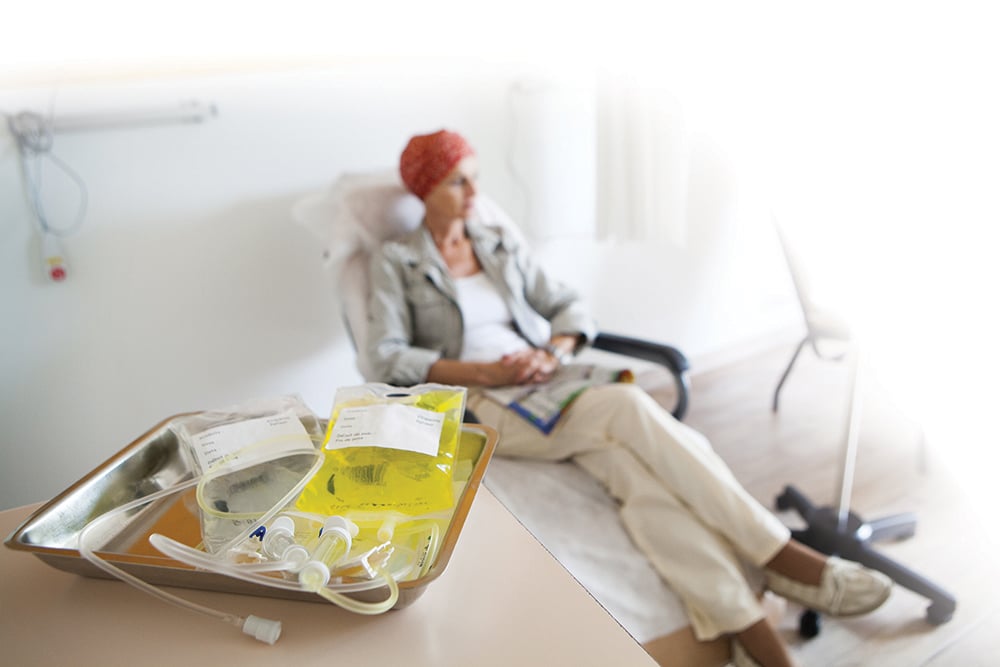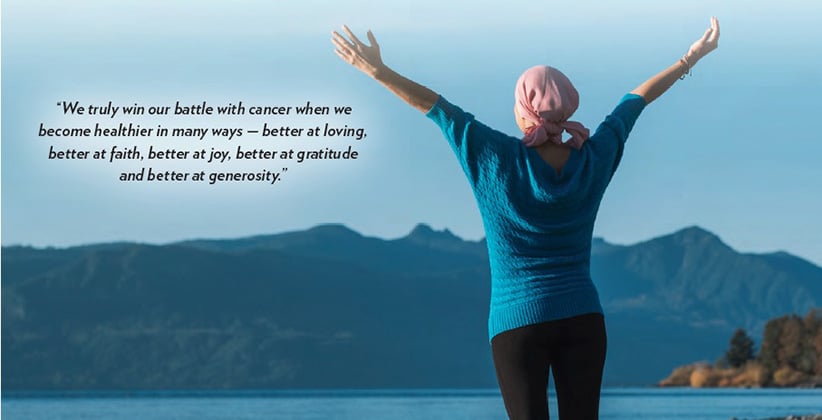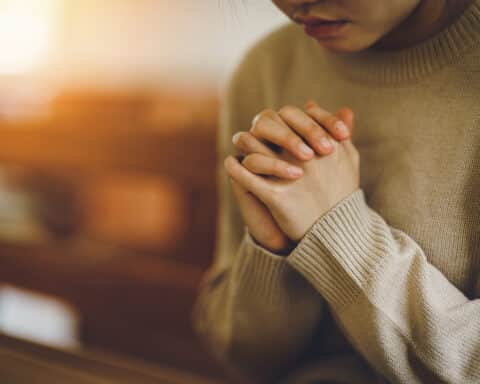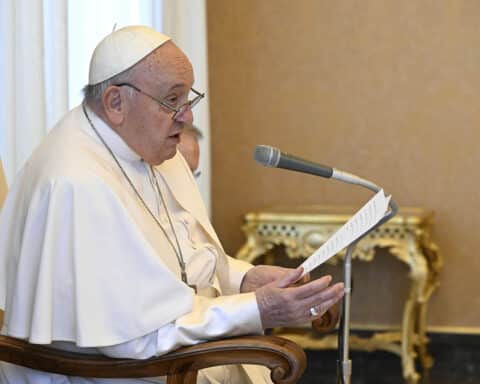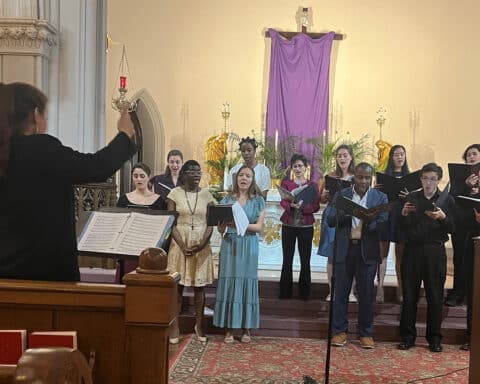Cancer — or any other major illness — might be a challenge to our faith. Or it can help our faith grow deeper than it has ever been before. The choice is up to us. It all depends on how much we turn to God in this time of need or how much we turn away from him.
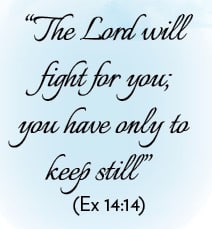
God understands our fear and anger better than anyone else, because he knows our hearts. We might feel that we must put on a brave face for family, friends or medical personnel. With God, however, we can be completely honest. We can trust him. To build that trust, we need to spend more time with God. We don’t trust someone we do not know well. One quick daily prayer and one Mass on Sunday will not be enough to give us the faith we need to fight cancer with peace and hope.
It may seem ironic to think that we should fight with peace. However, that is exactly what Jesus taught us when soldiers surrounded him in the Garden of Gethsemane and he told Peter, “Put your sword back into its sheath” (Mt 26:52). Surrendering this fight to Our Lord can be healing for our body and our soul. We do not have to fight with anger and fear. God offers us a better way. He offers us a tranquil way. That does not mean we give up. It means we give it all over to Jesus. We open ourselves to his miracles. We surrender ourselves to his holy will. We learn lessons from his life on earth and his saints. We believe in the power of prayer and ask others to pray for us. We use our suffering for good and we seek to find the good in our suffering.
Trust in God’s miracles
Our God is a God who cures. The Gospels show us that. One great way to spend more healing time with God is to read his Gospels. We might particularly want to study the many stories of Our Lord’s miraculous cures. Jesus healed the sick, the lame, the blind, the mute, the lepers, the possessed and even those who appeared already dead. One of the most comprehensive listings of miracles occurs in the eighth and ninth chapters of the Gospel of Matthew. Yet, healing miracles are sprinkled throughout all four Gospels.

God still works healing miracles today, but he mostly does it quietly through other people. The miracle is not likely to be that we wake up one morning to find our cancer totally gone. Thus, it can be foolish to refuse treatment and rely only on prayer. The miracle is that God sent the paramedic who arrived in time. God inspired the scientist to discover a more effective cure. God let the cancer be discovered before it was too advanced. He guided the nurse who noticed something wrong and the doctor who stayed up late researching the best treatment option. These are all God’s miracles.
God never abandons us. Even in the midst of the worst news, the most dreaded diagnosis, God is there with us. He is answering prayers before we even know to pray them — for God is timeless. We need to bring our treatment decisions before God and ask him to guide and inspire us. Through prayer, Scripture reading and even journaling, we will find the answers and the peace we need. When we start a journal entry with “Dear God” and we write to him about our questions and fears, at some point it can seem as if God has taken the pen from our hands and the right answers begin to flow upon the paper.
“Even in the midst of the worst news, the most dreaded diagnosis, God is there with us. He is answering prayers before we even know to pray them — for God is timeless.”
| A prayer for fighting cancer |
|---|
| Dear Lord,
I am scared. Please unwrap me from the fear and worry that are so tangled around me. Bring your healing into my life today. Give me courage to face the treatments and procedures that are your miracles for me. Lead me to the right caregivers and inspire them to do all that is best for me. Help me surrender with hope to your will. Remind me that your will is always good, even when I cannot see or understand that. Give me the sure confidence that I can fight this battle with you beside me. Please hear the prayers of all those who are praying for me. Thank you for the peace and the strength they bring to me. Keep me from being too self-centered. Instead, remind me to offer my pain to you for someone who is in greater need than I am. Show me how to accept my suffering with love, just as you did upon the cross. Please help me to learn the lessons you want me to learn from this challenging time in my life. Help me grow in mercy, compassion, faith and holiness. Remind me that you can bring blessings out of what seems like the worst of curses. If it is your will, may my body, mind, heart and soul all grow to be better than they have ever been before. Let me live each day with your healing peace. Thank you, dearest Lord. Amen. |
Surrender to God’s will
The best way to find peace in any health crisis is through the words Jesus taught us to trustingly pray to our heavenly Father. We must simply say, “your will be done” (Mt 6:10). This can be scary. However, surrendering to God’s will is not giving up to an enemy. Rather, it is joining forces with the highest power in the universe. It is agreeing to work with the one whose plan is always and forever good. God cannot begin to want anything that is bad. Bad things happen in this world, not because God wants them, but because he has given us free will. Our own free will and the free will of others can lead to all kinds of personal and environmental causes for illness. This was never God’s will. But since original sin, human sins have led to suffering. Uniting our will with God’s will helps us to spiritually accept and even conquer that evil.
 There is a beauty that comes in offering our lives back to God rather than fearing he will snatch them from us. When we put all things in God’s hands, we can find hope in his perfect plan, even when we do not know or understand it. Maybe there are lessons we must learn. Maybe there is an example we must set. Maybe there is one soul that can only be saved by our journey through cancer. Maybe that one is us. Maybe it is someone we know. It might be hard to believe God can bring good out of our fear, pain and sickness, but God’s ways are always mysterious and blessed. Even though God did not will our sickness upon us, he did know we would face it. He knows how to bring good out of it.
There is a beauty that comes in offering our lives back to God rather than fearing he will snatch them from us. When we put all things in God’s hands, we can find hope in his perfect plan, even when we do not know or understand it. Maybe there are lessons we must learn. Maybe there is an example we must set. Maybe there is one soul that can only be saved by our journey through cancer. Maybe that one is us. Maybe it is someone we know. It might be hard to believe God can bring good out of our fear, pain and sickness, but God’s ways are always mysterious and blessed. Even though God did not will our sickness upon us, he did know we would face it. He knows how to bring good out of it.
Part of surrendering is accepting that some suffering is necessary in every life. Even Jesus suffered. If God did not spare his own Son, how arrogant is it of us to think that we should waltz through life without suffering. This is why, even when Jesus was on earth, he did not cure everyone. Just the simple act of slightly bowing our head every time we say the words in the Our Father, “your will be done,” can help calm our fear. If God’s will seems too hard for us to accept, we might want to seek help from a good priest or chaplain.
“There is a beauty that comes in offering our lives back to God rather than fearing he will snatch them from us. When we put all things in God’s hands, we can find hope in his perfect plan, even when we do not know or understand it.”
Ask for prayers
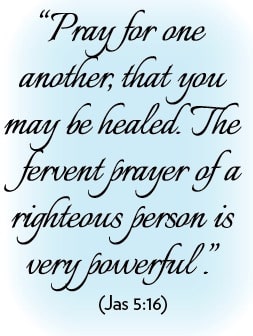
We see in the Gospels that often it was someone else — a parent, master or friend — who asked Jesus to heal the sick person. Thus, we should not hesitate to let others carry us to Jesus. When we begin to tell people of our need for prayers, it is so beautiful to learn the wonderful ways that others will pray for us. Many people told me exactly what hour of the day they would pray or what special devotion they were saying for me.
| Saintly intercessors |
|---|
|
We can entrust our worry not only to the prayer of living friends, but also to those in heaven. Here are just a few suggestions.  The Blessed Mother The Blessed Mother Since the marriage feast at Cana, no one has had more success at asking her Son for miracles than Mary. Praying her Rosary can be a very peaceful way to wait in a doctor’s office. Reflecting on the mysteries can bring us new hope for our lives.  Pope St. John XXIII Pope St. John XXIIIThis modern saint was fighting stomach cancer when he convened the Second Vatican Council. He showed us cancer does not have to stop us from doing great deeds. His “Daily Decalogue” — popularly known as “Only for Today” — tells us he prayed often that only for one day he would have no fear, and he would not be afraid to enjoy what was beautiful and to believe in goodness. This and the nine other prayers in the “Decalogue” are great goals for those of us who are sick. The “Decalogue” can easily be found online.  St. Thérèse of Lisieux St. Thérèse of LisieuxThis simple woman is one of the most popular saints of our time. She was only 24 years old when she died a painful death from tuberculosis, yet she has left a lasting imprint on hearts all around the world. She said that she did not mind dying because she hoped that God would let her spend eternity sending a shower of roses upon the earth. People across the globe tell stories of roses appearing when a prayer to St. Thérèse is answered.  St. Peregrine St. PeregrineThis holy man spent his life caring for the sick, until he developed a large, cancerous sore on his leg. The only hope was to amputate. The night before his surgery, he dreamed that Jesus reached down from the cross, touched his leg and healed it. That morning, when he awoke, the cancer was completely gone. He is the Church’s official patron saint for anyone with cancer. This is just a small sampling of those in heaven who can help us find peace in our fight against illness. Let us not fail to ask for their help. |
Do not waste the suffering
When, as children, we would hear adults tell us, “Offer it up,” we may have wondered, “How does me eating peas help a poor child in India?” However, any suffering can be turned into prayer. Thus, when our sickness forces pain upon us, we can use it for good.

The words, “This is going to sting,” (which is really just a nice word for “hurt”) can be a trigger for us to whisper to God, “This is for my sister, friend or grandchild.” We can offer our pain for someone else who is carrying a greater or similar burden, for a stranger in the waiting room or for a world crisis. We may decide to offer our pain for overly stressed medical personnel. There is no end to the great good our small agony can do. Offering a difficult situation up for someone else can instantly redirect our self-centered fear into calming thoughts of love and care for another.
Not only can our suffering be used to help others, but it can draw us closer to Christ, who suffered so much for us. St. Mother Teresa once said, “We are all able to go through the most terrible places fearlessly because Jesus is with us.” I discovered that during my radiation treatments. I felt God deeply with me at those times. There were no distractions. It was just God and me in an empty, gray tunnel. For me, it was a time for prayers of trust, hope and surrender. I would rest my fingers in the place in my palm where the Body of Christ had been placed that morning at Communion and know that God was still there with me.
“Offering a difficult situation up for someone else can instantly redirect our self-centered fear into calming thoughts of love and care for another.”
Look for the good
Shortly after my cancer surgery, my nurse made a small circle with her thumb and first finger and kindly said to me, “Your cancer was this big. Please do not let it define you.” It can be so easy to let sickness become our new identity. It can excuse us from doing things we do not want to do. It can make us the key player for all those around us in the drama of life. However, there are much better ways for us to live than with a “poor me” attitude.

In “The Imitation of Christ,” Thomas a’ Kempis asks the critical question, “What good it is to live long when we improve little?” Certainly, our illness makes no sense at all, if we do not use it as a time to get better in many ways. Cancer may or may not lead us to be better in our bodies. But it can always lead us to be more loving in our heart, more compassionate in our mind and more holy in our souls. We don’t gain much if we only become better physically but fail to become better spiritually, emotionally and personally. We truly win our battle with cancer when we become healthier in many ways — better at loving, better at faith, better at joy, better at gratitude and better at generosity.
Let us hope that people will see that we enjoy and cherish life more. Let us hope that people will see how we trust God more and worry less about foolish things. Let us be more at peace from this day forward. Let us appreciate more fully our life on earth. Yet, let us not forget that our true home is in heaven. Having faced that reality, let us live our final days with all the grace, love, joy and beauty that God forever intended for us. Let us create for ourselves and for those around us the most glorious of sunsets, whenever that day comes for us to be forever united in peace with Our Lord.
Susan M. Erschen writes from Missouri.
| A book for the journey |
|---|
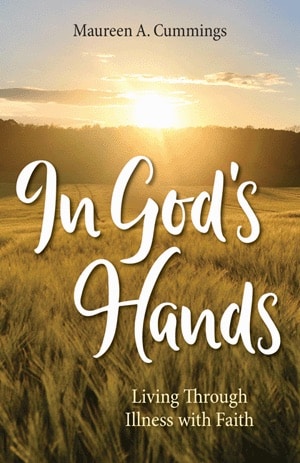 When one receives a devastating diagnosis or their loved one does, it is difficult to know how to handle it. When one receives a devastating diagnosis or their loved one does, it is difficult to know how to handle it.
In her book “In God’s Hands: Living Through Illness with Faith” (OSV, $13.95), author Maureen Cummings offers advice on how to manage the shock of a diagnosis, encouragement on talking with God, and tips for how to write a daily gratitude journal. Purchase at osvcatholicbookstore.com. |

